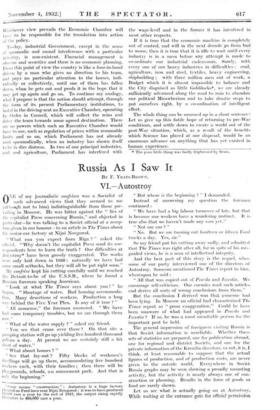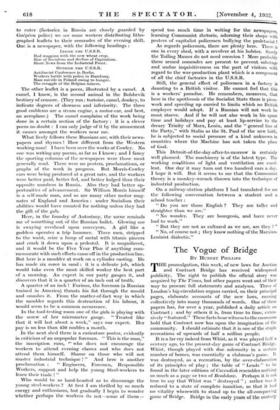Russia As I Saw It
By F. YEAM-BROWN.
VI.—Autostroy
ONE of my journalistic confreres was a Socialist of such advanced views that they seemed to me (although not to him) indistinguishable from those pre- vailing in Moscow. lie was bitter against the " lies of the capitalist Press concerning Russia," and objected in particular—he was talking to a Soviet official at a recep- tion given in our honour—to an article in The Times about the motor-car factory at Nijni Novgorod.
"What can you expect from Riga ? " asked the official. "Why doesn't the capitalist Press send its cor- respondents here to learn the truth ? Our difficulties at Autostroy* have been grossly exaggerated. The works were only laid down in 1930: naturally we have had some small setbacks, blit they will all be put right soon."
My 'confrere kept his cutting carefully until we reached the Detroit-to-be of the U.S.S.R., where he found a Russian foreman speaking American.
"Look at what The Times says about you ! " he began. "Shortage of water. Bad housing accommoda- tion. Many desertions of workers. Production a long way behind the Five Year Plan. Is any of it true ? "
" All nonsense," the foreman answered. "We have had some temporary troubles, but we are through them now."
"What of the water supply ? " asked my friend.
"You see that crane over there ? On that site a Pumping station will go up yielding five hundred thousand gallons a day. At present we are certainly still a bit short of water."
"What about houses ? "
"See that lay-out ? Fifty blocks of workmen's dwellings will go up there, accommodating five hundred Workers each, with their families ; then there will be Playgrounds, schools, an amusement park. And that is Only the beginning."
'.troy means " construction : Autostroy is a huge factory Planned on Ford lines near Nijni Novgorod : it was to have produced 60.000 ears a year by the end of 1932, the output riming rapidly therNdter to 400,000 cars a year. " But where is the beginning ? " I demanded.
Instead of answering my question the foreman continued : " We have had a big labour turnover of late, but that is because our workers have a wandering instinct. It is true also that we haven't made any cars yet."
"Not one ear? "
"No. But we are turning out fourteen or fifteen Ford trucks a day. Yes, sir."
So my friend put his cutting away sadly, and admitted that The Times was right after all, for in spite of his mis- guided views, he is a man of intellectual integrity.
And the best part of this story is the sequel, when some of our party interviewed one of the directors or Autostroy. Someone mentioned The Tithes report. to hini, • whereupon he said : "All that was copied out of Pravda and lzvestia. We encourage self-criticism. Our enemies read such articles and derive all sorts of wrong conclusions from them."
But the conclusion I derived was that someone had been lying. In Moscow an official had characterized The Times report as "gross exaggeration." Could he have been unaware of what had appeared in Pravda and Irvestia ? If So, he was a most unsuitable person for the important post be held.
The general impression of foreigners visiting-Russia is that Soviet information is unreliable. Whether three sets of statistics are prepared, one for publication abroad, one for regional and district Soviets, and one for the private information of the Kremlin directors, or not, it is, I think, at least reasonable to suppose that the actual figures of production, and of production costs, are never given to the outside world. Everywhere in Soviet Russia graphs may be seen showing a proudly mounting activity, but the activity is nearly always one of con- struction or planning. Results in the form of goods or food are rarely shown.
Let us see what is actually going on at Autostroy. While waiting at the entrance gate for official permission to enter (factories in Russia are closely guarded by Guepeou police) we see some workers distributing litho- graphed leaflets to their comrades of the evening shift. One is a newspaper, with the following headings : INSIDE THE U.S.S.R. Red waggons with the new wheat crop. Rise of Socialism and decline of Capitalism. Short News from the Industrial Front.
OUTSIDE THE U.S.S.R. Antifascist Conference in Berlin. Workers battle with police in Hamburg. Mass suicide in Poland owing to hunger. The struggle of the Belgian miners.
The other leaflet is a poem, illustrated by a camel. A camel, I know, is the second animal in the Bolshevik bestiary of censure. (They run: tortoise, camel, donkey, to indicate degrees of slowness and inferiority. The three good emblems are a steam engine, a motor-car, and best, an aeroplane.) The camel complains of the work being done in a certain section of the factory : it is a clever poem no doubt : I can only judge of it by the amusement it causes amongst the workers near me.
What lively fellows these Russians are, with their news- papers and rhymes ! How different from the Western working man! I have been over the works at Cowley. No one was writing any poems, as far as I know; and I fancy the sporting columns of the newspapers were those most generally read. There were no posters, proclamations, or graphs of the work in progress. But Morris-Cowley cars were being produced at a great rate, and the workers were better paid, better fed, and better lodged than their opposite numbers in Russia. Also they had better op- portunities of advancement. Sir William Morris himself is a self-made man, and so are many other motor mag- nates of England and America : under Socialism their abilities would have counted for nothing unless they had the gift of the gab.
Here, in the foundry of Autostroy, the scene reminds me of something out of the Russian ballet. Glowing ore is swaying overhead upon conveyors. A girl like a goddess operates a trip hammer. Three men, stripped to the waist, seize a lump of metal with titanic pincers and crash it down upon a pedestal. It is magnificent, and it would be the Five Year Plan if anything com- mensurate with such efforts came off in the production line. But here is a moulder at work on a cylinder casting. He has made six cores in sand : it is a delicate job, which would take even the most skilled worker the best part of a morning. An expert in our party gauges it, and discovers that it is a quarter of an inch out of truth.
A quarter of an inch ! Furious, the foreman (a Russian trained in America) thrusts his fist through the mould and smashes it. From the matter-of-fact way in which the moulder regards this destruction of his labour, it would seem to be a common occurrence.
In the tool-testing room one of the girls is playing with the screw of her micrometer gauge. "Treated like that it will last about a week," says our expert. Her pay is no less than 450 roubles a month.
,In the next shed there is a caricature poster, evidently in criticism of an unpopular foreman. "This is the man," the inscription ,,runs, I" who does not encourage the workers to attend evening classes and who does not attend them himself. Shame on those who will not master industrial technique ! " And here is another proclamation : " Engineers, Foremen, Responsible Workers, support and help the young Steel-workers to learn their trade ! "
Who would be so hard-hearted as to discourage the young steel-workers ? At first I am thrilled by so much energy and enthusiasm, but gradually I begin to wonder whether perhaps the workers do not—some of them— hem spend spend too much time in writing for the newspapers, learning Communist rhetoric, adorning their shops with posters of capitalist policemen bullying the proletariat.?
As regards policemen, there are plenty here. There is one in every shed, with a revolver at his holster. Surely the Toiling Masses do not need coercion ? More probably these armed comrades are present to prevent, sabotage and undue inquisitiveness on the part of visitors with regard to the war-production plant which is a component of all the chief factories in the U.S.S.R.
Still, the general effect of policemen in a factory is daunting to a British visitor. He cannot feel that this is a workers' paradise. He remembers, moreover, that here in the apotheosis of the Socialist State there is piece- work and speeding up carried to limits which no British • employer would adopt. If a Russian will not work he must starve. And if he will not also work in his spare time and holidays and pay at least lip-service to the dreary Trinity of Marx, Lenin, and the "general line of the Party," with Stalin as the St. Paul of the new faith, he is subjected to social pressure of a kind unknown in countries where the Machine has not taken the place of God.
This Detroit-of-the-day-after-to-morrow is certainly well planned. The machinery is of the latest type. The working conditions of light and ventilation are excel- lent. One day it may turn out two hundred cars a day. I hope it will. But it seems to me that the Communist theory is a monkey-wrench thrown into the technique of industrial production.
On a railway-station platform I had translated for me the following conversation between a student and a school teacher : "Do you see those English ? They are takler and straighter than we are."
"No wonder. They are bourgeois, and have never had to work."
"But they are not as cultured as we are, are they ? " "No, of course not ; they know nothing of the Marxian- Leninist dialectic."











































 Previous page
Previous page